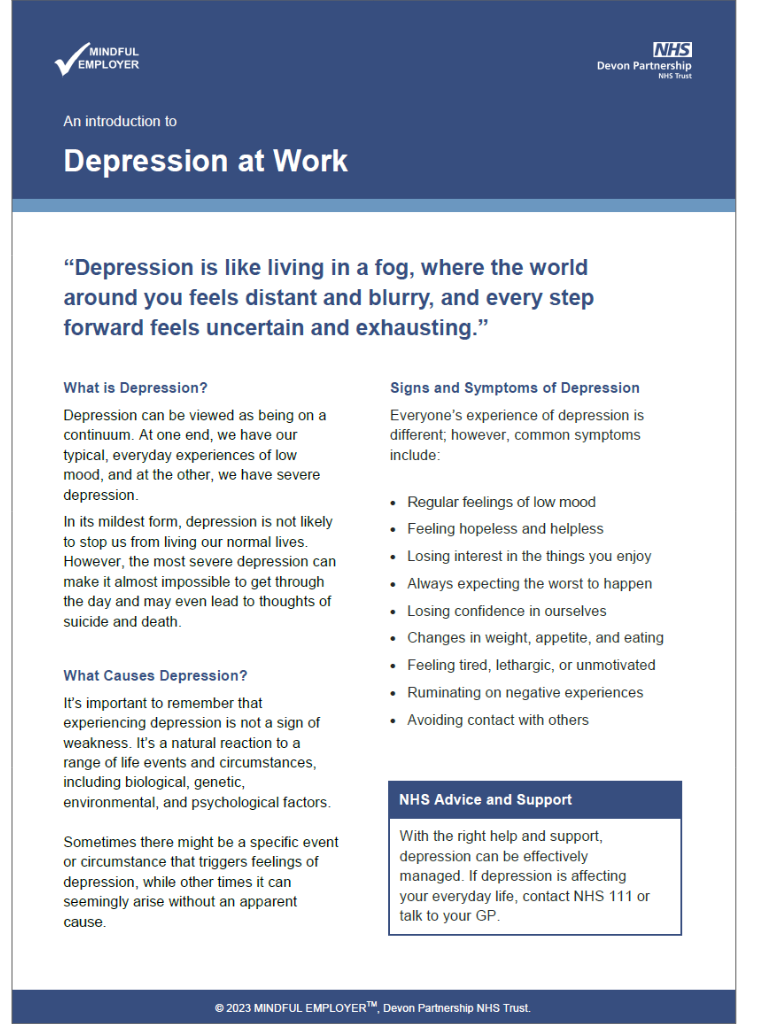Contents:
What is Depression? | What Causes Depression? | Signs and Symptoms of Depression | Managing Depression at Work
“Depression is like living in a fog, where the world around you feels distant and blurry, and every step forward feels uncertain and exhausting.”
What is Depression?
Depression can be viewed as being on a continuum. At one end, we have our typical, everyday experiences of low mood, and at the other, we have severe depression.
In its mildest form, depression is not likely to stop us from living our normal lives. However, the most severe depression can make it almost impossible to get through the day and may even lead to thoughts of suicide and death.
What Causes Depression?
It’s important to remember that experiencing depression is not a sign of weakness. It’s a natural reaction to a range of life events and circumstances, including biological, genetic, environmental, and psychological factors.
Sometimes there might be a specific event or circumstance that triggers feelings of depression, while other times it can seemingly arise without an apparent cause.
Signs and Symptoms of Depression
Everyone’s experience of depression is different; however, common symptoms include:
- Regular feelings of low mood
- Feeling hopeless and helpless
- Losing interest in the things you enjoy
- Always expecting the worst to happen
- Losing confidence in ourselves
- Changes in weight, appetite, and eating
- Feeling tired, lethargic, or unmotivated
- Ruminating on negative experiences
- Avoiding contact with others
| If depression is affecting your everyday life, contact NHS 111 or talk to your GP.
Managing Depression at Work
For many of us, our jobs provide us with a sense of routine and accomplishment. However, the interplay between work and depression can significantly affect our job performance.
When we feel depressed, difficulties concentrating might lead us to make mistakes or miss deadlines. Additionally, a lack of energy and motivation might hinder our productivity or strain our professional relationships. For example, we might struggle to participate in meetings or feel overwhelmed by routine responsibilities. It’s important we recognise how our mood may be affecting our work and find ways of managing depression. To do this, we can try:
- Making a Daily Plan
When we’re depressed, we often don’t feel like doing anything. However, research suggests that by reducing our activity, we lower our mood further. By making a daily plan to engage in small, manageable activities, we can gradually increase our activity levels. Be sure to break tasks down and aim for a mix of enjoyable, necessary, and routine tasks throughout the week. - Recording our Achievements
It’s easy to forget our accomplishments, even at the best of times. By taking the time to write down our achievements each day, no matter how small, we can start to recognise our progress and build our self-esteem. - Balancing our Thoughts
When we feel depressed, we tend to be much more pessimistic in our thinking. However, by challenging these negative thoughts, we can begin to refocus on the positives. The next time you experience a negative thought, try to balance it out with a more accurate and positive statement about yourself. For example, you could balance “I’m useless at my job” with “I bring a unique perspective to my role that helps to contribute to the team's success.” - Keeping a Gratitude Journal
Studies have shown that by taking the time to write down a few of the things we are thankful for each evening, such as a kind gesture from a colleague, we can improve our mood.
Above all, it’s important to remember that we’re not alone. If you’re struggling with depression at work, reach out to a trusted colleague or manager for support. Alternatively, you may have access to an employee assistance program or wellbeing champion who can offer further advice.


